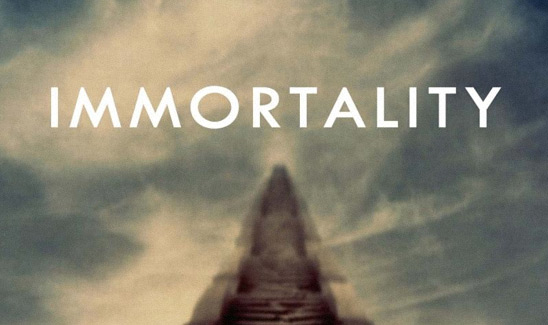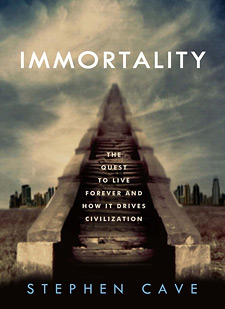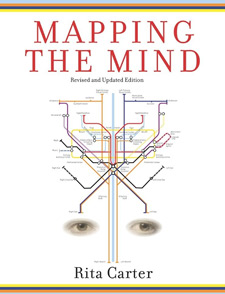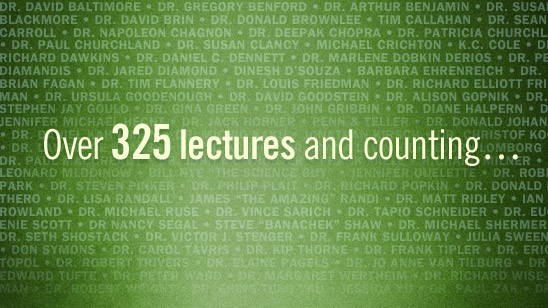In this week’s eSkeptic:
- Available Digitally Now: Skeptic magazine 18.1: The Mass Murder Problem
- Call for Extras and Location: for the 1st in a new series of videos
- MonsterTalk: The Zombie Antpocalypse
- Feature Article: What Science Really Says About the Soul
- Our Next Lecture: Dr. Adam Grant on a Revolutionary Approach to Success
Skeptic magazine 18.1
The Mass Murder Problem
and What to Do About It
The latest issue is now available digitally via the Skeptic Magazine App for iOS, Android, BlackBerry PlayBook, Kindle Fire HD, Mac, PC, and Windows 8 devices, as well as in print from Shop Skeptic. This issue won’t likely hit newsstands for another week or two.
CALL FOR EXTRAS
for the 1st in a new series of videos
This Friday and Saturday (March 22 and 23), we are filming the first episode in a new series of videos with Brian Dalton and Michael Shermer that combine the ideas and principles of Skepticism and Skeptic Magazine with the humor and satire of The Mr. Deity Show and The Way of the Mister. We are in need of extras in the Southern California area and a location in the form of a school or classroom. If you would like to be in the episode and/or know of a classroom we could use on Saturday, please email Brian Dalton.


Polyrhachis armata
The Zombie Antpocalypse
What if your will were not your own? What if your mind were being controlled by something other than your own volition? This isn’t an imaginary scenario. Real lifeforms here on earth can profoundly influence the behavior of other lifeforms, turning them into helpless zombies, forced to do the bidding of their emotionless masters. In this episode of MonsterTalk, we interview entomologist David Hughes about host behavior modification by parasitic organisms.

About this week’s eSkeptic
The majority of Americans believe that the soul lives on after the body dies. How can we know whether consciousness can survive bodily death? In this week’s eSkeptic, Stephen Cave takes a look at the belief that souls exist, and reminds us that modern brain imaging technology provides scientific evidence to strengthen the case against such fuzzy notions.
Stephen Cave is a writer, philosopher and critic. He has a Ph.D. in metaphysics from the University of Cambridge and, before dedicating himself to writing, worked as a British diplomat and policy advisor. Stephen has since written on many philosophical, ethical and scientific subjects, from human nature to robot warriors. He writes regularly for the Financial Times, and has also written for the New York Times, Guardian, Wired and others. His book, Immortality: The Quest to Live Forever and How It Drives Civilization (Crown, 2012) was a New Scientist best book of the year. He lives in Berlin.
What Science Really Says
About the Soul
by Stephen Cave
Nathalie was hemorrhaging badly. She felt weak, cold, and the pain in her abdomen was excruciating. A nurse ran out to fetch the doctor, but by the time they arrived she knew she was slipping away. The doctor was shouting instructions when quite suddenly the pain stopped. She felt free—and found herself floating above the drama, looking down at the bustle of activity around her now still body.
“We’ve lost her,” she heard the doctor say, but Nathalie was already moving on and upwards, into a tunnel of light. She first felt a pang of anxiety at leaving her husband and children, but it was soon overwhelmed by a feeling of profound peace; a feeling that it would all be okay. At the end of the tunnel, a figure of pure radiance was waiting with arms wide open.
This, or something like it, is how millions imagine what it will be like to die. In 2009, over 70 percent of Americans said they believe that they, like Nathalie, have a soul that will survive the end of their body.1 That figure may well now be higher after the phenomenal success of two recent books describing vivid near death experiences: one from an innocent—the four year old Todd Burpo—the other from the opposite: a Harvard scientist and former skeptic, neurosurgeon Dr. Eben Alexander.2 Both argue that when their brains stopped working, their souls floated off to experience a better place.
This is an attractive view and a great consolation to those who have lost loved ones or who are contemplating their own mortality. Many also believe this view to be beyond the realm of science, to concern a different dimension into which no microscope can peer. Dr. Alexander, for example, said in an interview with the New York Times, “Our spirit is not dependent on the brain or body; it is eternal, and no one has one sentence worth of hard evidence that it isn’t.”3
But he is wrong. The evidence of science, when brought together with an ancient argument, provides a very powerful case against the existence of a soul that can carry forward your essence once your body fails. The case runs like this: with modern brain-imaging technology, we can now see how specific, localized brain injuries damage or even destroy aspects of a person’s mental life. These are the sorts of dysfunctions that Oliver Sacks brought to the world in his book The Man Who Mistook His Wife For A Hat.4 The man of the title story was a lucid, intelligent music teacher, who had lost the ability to recognize faces and other familiar objects due to damage to his visual cortex.
Since then, countless examples of such dysfunction have been documented—to the point that every part of the mind can now be seen to fail when some part of the brain fails. The neuroscientist Antonio Damasio has studied many such cases.5 He records a stroke victim, for example, who had lost any capacity for emotion; patients who lost all creativity following brain surgery; and others who lost the ability to make decisions. One man with a brain tumor lost what we might call his moral character, becoming irresponsible and disregarding of social norms. I saw something similar in my own father, who also had a brain tumor: it caused profound changes in his personality and capacities before it eventually killed him.
The crux of the challenge then is this: those who believe they have a soul that survives bodily death typically believe that this soul will enable them, like Nathalie in the story above, to see, think, feel, love, reason and do many other things fitting for a happy afterlife. But if we each have a soul that enables us to see, think and feel after the total destruction of the body, why, in the cases of dysfunction documented by neuroscientists, do these souls not enable us to see, think and feel when only a small portion of the brain is destroyed?
To make the argument clear, we can take the example of sight. If either your eyes or the optic nerves in your brain are sufficiently badly damaged, you will go blind. This tells us very clearly that the faculty of sight is dependent upon functioning eyes and optic nerves.
Yet curiously, when many people imagine their soul leaving their body, they imagine being able to see—like Nathalie, looking down on her own corpse surrounded by frantic doctors.6 They believe, therefore, that their soul can see. But if the soul can see when the entire brain and body have stopped working, why, in the case of people with damaged optic nerves, can’t it see when only part of the brain and body have stopped working? In other words, if blind people have a soul that can see, why are they blind?
So eminent a theologian as Saint Thomas Aquinas, writing 750 years ago, believed this question had no satisfactory answer.7 Without its body—without eyes, ears and nose—he thought the soul would be deprived of all senses, waiting blindly for the resurrection of the flesh to make it whole again. Aquinas concluded that the body-less soul would have only those powers that (in his view) were not dependent upon bodily organs: faculties such as reason and understanding.
But now we can see that these faculties are just as dependent upon a bodily organ—the brain—as sight is upon the eyes. Unlike in Aquinas’s day, we can now keep many people with brain damage alive and use neuroimaging to observe the correlations between that damage and their behavior. And what we observe is that the destruction of certain parts of the brain can destroy those cognitive faculties once thought to belong to the soul. So if he had had the evidence of neuroscience in front of him, we can only imagine that Aquinas himself would have concluded that these faculties also stop when the brain stops.
In fact, evidence now shows that everything the soul is supposed to be able to do—think, remember, love—fails when some relevant part of the brain fails. Even consciousness itself—otherwise there would be no general anesthetics. A syringe full of chemicals is sufficient to extinguish all awareness. For anyone who believes something like the Nathalie story—that consciousness can survive bodily death—this is an embarrassing fact. If the soul can sustain our consciousness after death, when the brain has shut down permanently, why can it not do so when the brain has shut down temporarily?
Some defenders of the soul have, of course, attempted to answer this question. They argue, for example, that the soul needs a functioning body in this world, but not in the next. One view is that the soul is like a broadcaster and the body like a receiver—something akin to a television station and a TV set. (Though as our body is also the source of our sensory input, we have to imagine the TV set also has a camera on top feeding images to the distant station.)
We know that if we damage our TV set, we get a distorted picture. And if we break the set, we get no picture at all. The naive observer would believe the program was therefore gone. But we know that it is really still being transmitted; that the real broadcaster is actually elsewhere. Similarly, the soul could still be sending its signal even though the body is no longer able to receive it.
This response sounds seductive, but helps little. First, it does not really address the main argument at all: Most believers expect their soul to be able to carry forward their mental life with or without the body; this is like saying that the TV signal sometimes needs a TV set to transform it into the picture, but once the set is kaput, can make the picture all by itself. But if it can make the picture all by itself, why does it sometimes act through an unreliable set?
Second, changes to our bodies impact on our minds in ways not at all analogous to how damage to a TV set changes its output, even if we take into account damage to the camera too. The TV analogy claims there is something that remains untouched by such damage, some independent broadcaster preserving the real program even if it is distorted by bad reception. But this is precisely what the evidence of neuroscience undermines. Whereas damage to the TV set or camera might make the signal distorted or fuzzy, damage to our brains much more profoundly alters our minds. As we noted above, such damage can even change our moral views, emotional attachments, and the way we reason.
Which suggests we are nothing like a television; but much more like, for example, a music box: the music is not coming from elsewhere, but from the workings within the box itself. When the box is damaged, the music is impaired; and if the box is entirely destroyed, then the music stops for good.
There is much about consciousness that we still do not understand. We are only beginning to decipher its mysteries, and may never fully succeed. But all the evidence we have suggests that the wonders of the mind—even near-death and out of body experiences—are the effect of neurons firing. Contrary to the beliefs of the vast majority of people on Earth, from Hindus to New Age spiritualists, consciousness depends upon the brain and shares its fate to the end. ![]()
References
- What People Do and Do Not Believe In, The Harris Poll, December 15, 2009
- Burpo, T and Vincent, L. 2010. Heaven is For Real: A Little Boy’s Astounding Story of His Trip to Heaven and Back. Thomas Nelson Publishers; Alexander, Eben. 2012. Proof of Heaven: A Neurosurgeon’s Journey into the Afterlife. Simon & Schuster.
- Kaufman, L. 2012. “Readers Join Doctor’s Journey to the Afterworld’s Gates.” The New York Times, November 25, page C1.
- Sacks, Oliver. 1985. The Man Who Mistook His Wife For A Hat. New York: Simon & Schuster.
- Damasio, Antonio. 1994. Descartes’ Error: Emotion, Reason, and the Human Brain. New York: Putnam Publishing.
- Descriptions of heaven also involve being able to see, from Dante to Heaven is For Real, cited above.
- Aquinas’s views on the soul can be found in his Summa Theologica and elsewhere. Particularly relevant to the question of the soul’s limited faculties are Part 1, question 77, article 8 (“Whether all the powers remain in the soul when separated from the body?”) and supplement to the Third Part, question 70, article 1 (“Whether the sensitive powers remain in the separated soul?”), in which he writes: “Now it is evident that certain operations, whereof the soul’s powers are the principles, do not belong to the soul properly speaking but to the soul as united to the body, because they are not performed except through the medium of the body—such as to see, to hear, and so forth. Hence it follows that such like powers belong to the united soul and body as their subject, but to the soul as their quickening principle, just as the form is the principle of the properties of a composite being. Some operations, however, are performed by the soul without a bodily organ—for instance to understand, to consider, to will: wherefore, since these actions are proper to the soul, the powers that are the principles thereof belong to the soul not only as their principle but also as their subject. Therefore, since so long as the proper subject remains its proper passions must also remain, and when it is corrupted they also must be corrupted, it follows that these powers which use no bodily organ for their actions must needs remain in the separated body, while those which use a bodily organ must needs be corrupted when the body is corrupted: and such are all the powers belonging to the sensitive and the vegetative soul.”
Our Next Lecture at Caltech:
DR. ADAM GRANT
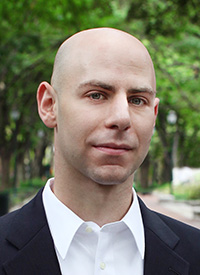
Give and Take:
A Revolutionary Approach
to Success
with Dr. Adam Grant
Sunday, April 28, 2013 at 2 pm
IN THIS LECTURE, based on his book on the psychology of human interactions, organizational psychologist (and the youngest tenured professor at the Wharton Business School) argues that as much as hard work, talent and luck, the way we choose to interact with other people defines our success or failure. Give and Take demolishes the “me-first” worldview and shows that the best way to get to the top is to focus not on your solo journey but on bringing others with you. Grant reveals how one of America’s best networkers developed his connections, why a creative genius behind one of the most popular shows in television history toiled for years in anonymity, how a basketball executive responsible for multiple draft busts turned things around, and how we could have anticipated Enron’s demise four years before the company collapsed—without ever looking at a single number.
Followed by…
- Odd Couples: Extraordinary Differences between the Sexes
in the Animal Kingdom
with Dr. Daphne J. Fairbairn
Sunday, May 19, 2013 at 2 pm
New Admission Policy and Prices
Please note there are important policy and pricing changes for this season of lectures at Caltech. Please review these changes now.



